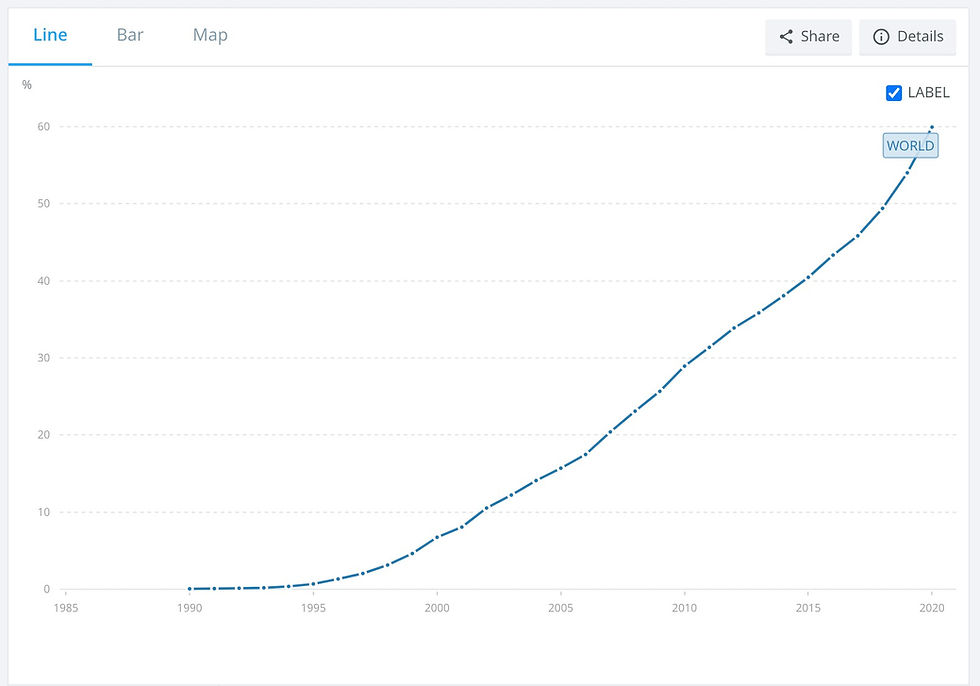You work in the real estate industry. Why care about blockchain?
- iliariaskoff
- Jul 10, 2022
- 4 min read
Updated: Jul 18, 2022
I’ll share how I got convinced, which is hopefully a starting point that resonates for you.
When I started looking into blockchain and wanted a better general understanding of it, I came across the book Basics of Bitcoins & Blockchains by Antony Lewis (@antony_btc) and found it a useful start*. It takes a broad perspective and covers cryptography’s history, the history of money, the why behind bitcoin and the general benefits of blockchain.
The book also refers to what one could call an ugly, basic video on blockchain technology (Blockchain 101 - A visual demo made by Anders Brownworth (@anders94).
I got hooked to blockchain since seeing that video. It's beautiful in its simplicity. Elegant. A simple display of how the technology works. It shows how blockchain creates efficiencies, and how it can make the need for trust redundant. This last point is a key driver behind blockchain’s potential and why it’s relevant for our industry.
My message in this post is two-fold:
Anticipate changes: It makes sense to stay tuned on the topic to anticipate changes in how our industry works (think: how we raise capital, how we do transactions, how we manage assets). Put bluntly: which jobs will stay, which jobs will go.
New business models: Blockchain in real estate can open up new business models and create large opportunities for anyone willing to lean in and learn now to benefit later.
1. Anticipate changes
Generally speaking technology tends to create efficiencies. It saves time and money. Look at the way you book a flight today or a pay at a self-service counter in the supermarket. Those changes challenged the jobs of a lot of people at the lower end of the income scale. The term technological unemployment was coined by Keynes in the 1930s and though it is mostly seen as a temporary phenomenon and on the flip side of it there is massive new job growth, this recurring tendency shouldn't be outright ignored.
What is different about blockchain's role in any potential technological unemployment?
This video from WIRED magazine explains blockchain on 5 levels of difficulty. It also shows that blockchain creates efficiencies on a different level from the general efficiency creation by technology mentioned above, meaning it can challenge the need for certain high-income jobs. It can do this because it allows for a) registering events e.g. a (real estate) transaction and b) executing tasks through smart contracts e.g. distribution of rental income without the need of a trusted intermediary**. Though any technology can surely challenge existing jobs at any income-level, blockchain has by its design the ability to directly impact the high-income ones.
On the other hand, it's needless to say that technology also creates a tremendous demand for new jobs at all income levels, whether in tech, sales, operations, etc. Benefiting from blockchain use cases can make high-income jobs also more efficient, freeing up time that can be used for more value creation and more income.
Example: having all rental income history on a blockchain, meaning it is immutable once it’s recorded on chain, allows for a more efficient due diligence needing less time and money for pre-transaction auditing, which both buying and selling teams benefit from.
Consensys, a large blockchain technology company, mentioned the following in its post Blockchain in Real Estate:
In the real estate market, the advice, knowledge, and know-how of real estate professionals will remain crucial to commercial buyers. However, the processing of securities, liability management, document processing, and accounting will inevitably change.
What does this, according to Consensys, inevitable change mean? Jobs disappearing or professionals benefiting from a new technology through adjustment of their tasks?
New business models
And then regarding point 2: you can chose to be on the other side of the table and create the efficiencies yourself by using blockchain as part of your new or existing business models. This has great potential in disciplines across the board of our industry, which I'll cover in future posts.
CONCLUSION
Already back in 2017 Harvard Business Review concluded its article The Truth About Blockchain as follows:
No matter what the context, there’s a strong possibility that blockchain will affect your business. The very big question is when.
Now we're 5 years later so it's useful to see whether we can pinpoint the 'when' better. In the next post I'll cover where blockchain stands today and then try to use a framework to couple potential use cases for real estate with a timeline to hopefully give more insight as to when which use case may affect the real estate industry.
So is blockchain a threat or an opportunity?
It’s all a matter of perspective. Like PlanB mentioned a few weeks back:
PlanB is a former institutional investor with 25 years of experience in financial markets. He also is the creator of the bitcoin stock-to-flow (S2F) model which gained a large following.
*For more books on blockchain basics, see this 5 minute video in which CoinBureau recommends 4 additional books to the one above. Also, this video from Simply Explained can be a useful starting point. For anyone who can handle a dry read and wants to go straight to the source, you can find the 9-page bitcoin whitepaper here. I recommend it for understanding the philosophy behind bitcoin's creator(s) – it’s still unclear whether Satoshi Nakamoto is a person or a group of people.
**For more information on smart contracts, please see this video from Simply Explained.



Comments